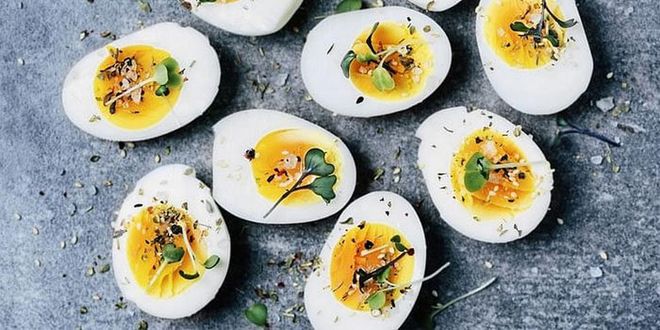The Top 10 Best High-Protein Foods You Should Be Eating More Of
Why protein is a vital component of your diet—and the 10 top sources


Photo: Gettysalmonsal
Eggs
High-protein diets have been the buzzword of the weight-loss industry for a while now. But don’t be fooled into thinking that protein is a fad. In fact, it is an essential macronutrient, which means your body needs it in fairly large amounts in order to maintain optimal health.
We spoke to Fresh Fitness Food expert nutritionist, Georgia Head about why we need protein and the best high-protein foods to include in your diet:
Why do we need protein?
A vital component of every cell in your body, protein is used to help build and repair tissues, such as muscle, cartilage and skin. It’s also used in the production of hormones, enzymes and other bodily chemicals.
"For years, we’ve observed companies capitalising on the importance of protein in the diet, from the introduction of popular diet models, such as The Zone, Dukan and Paleo Diets, to the steady growth of the supplement industry," says Head.
"With such a vast amount of conflicting opinions and information available online, and so many products on offer, it can be difficult to know how to distinguish between what is healthy and what is merely a trend."
How much protein do we need?
"The recommended dietary allowance (RDA) is 0.8g protein per kg of body weight," reveals Head. For a person weighing 65kg (10st 2lb), for example, this equates to 52g protein per day – equivalent to roughly two palm-sized portions of meat, fish, tofu, beans or pulses.
"But this is a guideline for populations rather than individuals, meaning it is a very general guideline," Head continues. "Active individuals may require in the region of 1.2-2.0g per kg of body weight. For highly active people and athletes, this figure can exceed 2.0g per kg of body weight.
"It is vital to note there is a large body of research into protein requirements, much of it providing conflicting results. Therefore, guidelines should be used as guidelines and not strict rules. The bottom line is, requirements are highly individual, as what works for one person may not for another in similar circumstances."
The ‘food first’ approach
Protein shakes and supplements are everywhere you look, but can we rely on these as adequate protein sources?
"While there is a time and place for protein supplements – and they should not be ousted altogether – as with all macro- and micro-nutrient intake, the priority should be to obtain adequate intake through a healthy and balanced diet," says Head. "Real, wholesome food should always come first. Supplements should not be used as a substitute."
10 of the best protein sources
Head outlines her top picks for good-quality protein sources:
This article originally appeared on Harper’s BAZAAR UK.
Related articles:
5 Tips For Smoothly Transitioning To A Vegan Diet
The Lowdown On Fad Diets: Atkins, Ketogenic, Paleolithic And More
This Is Exactly What Gwyneth Paltrow Eats In One Day